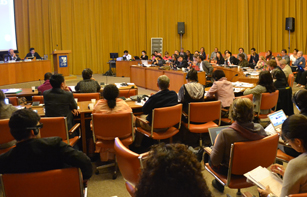
Female sex workers receiving HIV prevention information in Myanmar. Credit: UNAIDS/Seng Mai
The response to HIV, tuberculosis and malaria in three pilot countries has been dramatically enhanced with multimillion dollar grants from the Global Fund to Fight AIDS, Tuberculosis and Malaria. El Salvador, Myanmar and Zimbabwe will receive US$ 622 million from the recently created Global Fund’s new funding model.
The new model maximizes available resources and ensures that investments are strategically focused on programmes which have been proven to achieve the greatest possible impact.
Representing a shift in the Global Fund’s business model, it features new central elements such as a multi-partner country dialogue; followed by a focused concept note that summarizes the national context. The request for funding—an iterative application process— now includes increased engagement of technical partners such as UNAIDS.
Following the most recent Global Fund Board meeting in Sri Lanka (18-19 June) which approved the grants for the three early applicant nations, the Board’s chair Simon Bland said, “Countries have been able to act quickly to get this new funding model started, and that’s great news.” Mr Bland stressed that, “These first grants show how, by working with partners, we can reach more people facing these diseases.”
Technical guidance, partnerships and inclusion
Myanmar will receive more than US$ 315 million over the next four years, US$ 160 million of which is for the country’s AIDS response. A particular focus will be meeting an urgent need for antiretroviral treatment coverage with the goal of achieving universal access to HIV treatment by 2016, up from 43% in 2012. HIV services will also be expanded to reach more areas of the country and HIV prevention activities including harm reduction and methadone programming are to be increased.
UNAIDS and its Cosponsors collaborated in the Myanmar’s successful application through technical guidance and assistance. UNAIDS supported the Myanmar Technical Strategy Group on AIDS chaired by the government to facilitate a consultative process which identified programme priorities, with input from technical partners, key populations and programme implementers.
“As members of the Technical Strategy Group and the concept note drafting team, UNAIDS supported us through a transparent and inclusive consultation process,” said Soe Moe Kyaw, member of the Myanmar Positive Group. “Network members representing key populations of people who inject drugs, sex workers and men who have sex with men participated in meetings at which priorities and programmatic gaps were identified. They were also consulted directly to ensure that their priority needs were fully understood and incorporated in order to reflect and complete the country concept note,” added Mr Kyaw.
Countries have been able to act quickly to get this new funding model started, and that’s great news. These first grants show how, by working with partners, we can reach more people facing these diseases.
Chair of the Global Fund Board, Simon Bland
The grant to El Salvador, worth US$ 26.9 million, will improve access to HIV-related services and deliver treatment among key populations such as men who have sex with men, transgender people and sex workers. By 2016, it aims to reach more than 90% service coverage for these groups. UNAIDS helped national partners with the collection of evidence and epidemiological data and worked with civil society to support the country dialogue, which included key populations.
“The new funding approach allowed the country to identify gaps in the HIV response and to strengthen efforts to reach key populations, which have been engaged since the beginning of the process and will be key partners in the implementation of the grant,” said Dr Ana Isabel Nieto, Director of the National AIDS Programme. “We recognize the invaluable help which UNAIDS provided, especially in terms of collecting, analyzing and documenting strategic information to support the funding proposal.”
Zimbabwe will use its US$ 311 grant to further strengthen impressive gains in challenging HIV. The funding is intended to increase the total number of people on antiretroviral therapy from 565 000 to just over 893 000 by 2016. UNAIDS and partners played a key role in the application process.
"UNAIDS co-led a highly participatory country dialogue involving communities and key populations and provided critical support in the development of the concept note,” said Dr Henry Madzorera, Minister of Health and Child Welfare.
Each of the early applicant grants include investments in improving data systems so that countries can really know their epidemic and in better monitoring and evaluation of programmes designed to reach most affected populations. The new funding model will be fully implemented in 2014 and six other countries are currently going through the application process.







